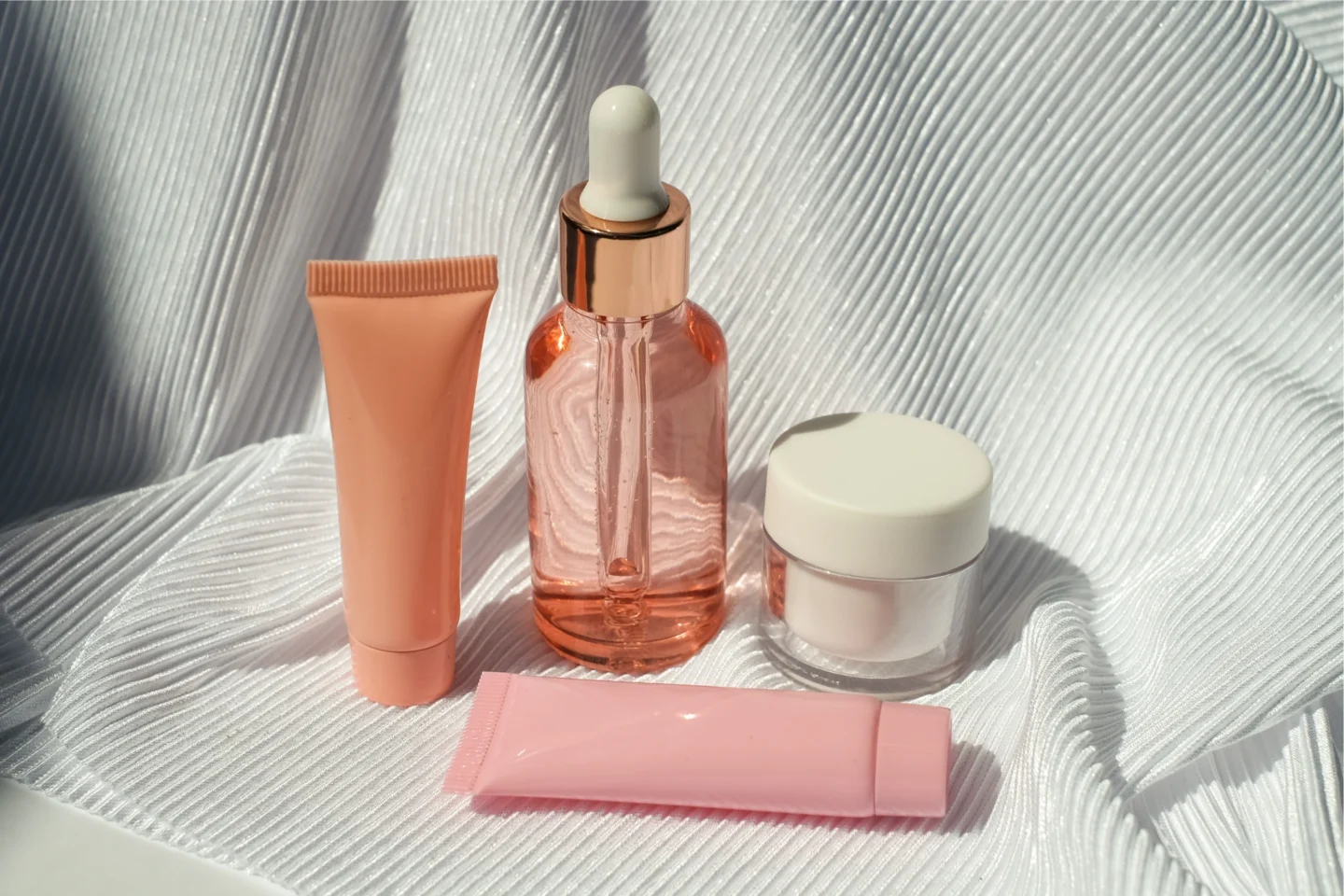
Beta hydroxy acids (BHAs) have become a buzzword in the skincare world, and for good reason. These chemical exfoliants offer numerous benefits for those looking to improve their skin’s texture, reduce acne, and achieve a brighter complexion.
In this guide, we’ll dive deep into what BHAs are, how they work, and the best ways to incorporate them into your skincare routine.
Whether you’re new to using chemical exfoliants or looking to optimize your routine for clearer, healthier skin, this article has you covered.
Let’s get started with the basics of what beta-hydroxy acids can do for your skin!
Beta hydroxy acids (BHAs) are a type of chemical exfoliant that is particularly effective for those with oily or acne-prone skin.
Unlike alpha hydroxy acids (AHAs), which are water-soluble, BHAs are oil-soluble, allowing them to penetrate deep into pores to target oil-based impurities. This unique property makes BHAs a powerful tool for unclogging pores, reducing inflammation, and improving skin texture.
But BHAs offer more than just acne-fighting benefits. They can also help reduce the appearance of hyperpigmentation, such as dark spots from sun damage or post-acne marks.
Additionally, research has shown that higher concentrations of BHAs, often found in professional chemical peels, can stimulate collagen production.
This means they can also play a role in improving skin texture and elasticity, making them a great option if you’re looking to address both acne and signs of aging.

How Do Beta Hydroxy Acids (BHAs) Work?
When applied to the skin, BHAs work by dissolving the bonds that hold dead skin cells together, allowing them to shed. This exfoliation process helps to unclog pores, reduce inflammation, and improve the skin’s overall appearance.
On top of that, BHAs can help regulate oil production, preventing the buildup of excess sebum that can lead to acne breakouts.
Key Benefits of Beta Hydroxy Acids (BHAs)
Beta-hydroxy acids offer a variety of benefits that make them a valuable addition to any skincare routine. Here are some of the key benefits:
Effective Exfoliation
BHAs gently exfoliate the skin, removing dead skin cells and promoting a smoother, brighter complexion. This is especially beneficial for those dealing with rough or uneven skin texture.
Acne Prevention and Treatment
BHAs are well-known for their effectiveness in preventing and treating acne. They penetrate deep into the pores to dissolve excess oil and debris, helping to keep breakouts at bay.
Reduction of Blackheads and Whiteheads
By exfoliating the skin and unclogging pores, BHAs effectively reduce the appearance of blackheads and whiteheads, promoting a clearer complexion.
Hyperpigmentation Treatment
BHAs can help to fade dark spots and hyperpigmentation.
Minimizing the Appearance of Pores
By keeping pores clear and preventing blockages, BHAs can help minimize their appearance, contributing to a more even skin surface.
Anti-Aging Effects
BHAs stimulate collagen production, which can help reduce the appearance of fine lines and wrinkles, leading to a more youthful complexion over time.
Common Uses of BHAs in Skincare
Beta-hydroxy acids (BHAs) are versatile ingredients found in various skincare products, making them a popular choice for addressing different skin concerns. Here are some common uses of BHAs in skincare:
- Cleansers
- Toners
- Serums
- Spot treatments
- Moisturizers
- Chemical peels (professional treatments)
The concentration of BHA in these products can vary, typically ranging from 0.5% to 2% for over-the-counter products.
Possible Side Effects and Considerations
While beta-hydroxy acids (BHAs) are generally safe and effective for many skin types, it’s important to be aware of potential side effects and considerations to ensure a positive experience. Here are a few key points to keep in mind:
Dryness or Peeling
BHAs can sometimes cause dryness or peeling, especially when you first start using them. This is a normal reaction as your skin adjusts, but be mindful of how your skin feels and consider using a moisturizer to help mitigate these effects.
Redness or Irritation
Some users may experience mild redness or irritation after applying BHA products. If you notice persistent discomfort, it might be a sign to reduce usage or try a lower concentration.
Increased Sun Sensitivity
BHAs can make your skin more sensitive to the sun. It’s essential to wear broad-spectrum sunscreen daily when incorporating BHAs into your skincare routine to protect against UV damage.
Being aware of these possible side effects will help you navigate your skincare journey with BHAs while maximizing their benefits.
How to Incorporate BHAs into Your Skincare Routine
When incorporating BHAs into your skincare routine, it’s important to start slowly and gradually increase usage as needed. Here are some tips:
Patch Test
Before applying a BHA product to your entire face, test it on a small area of skin to check for any reactions.
Choose the Right Product
Start by selecting a BHA product that suits your skin type and concerns. Look for cleansers, toners, serums, or spot treatments containing salicylic acid, which is the most common BHA.
Start Slowly
If you’re new to BHAs, begin with a product containing a lower concentration (1-2%) to allow your skin to adjust. Apply it every other day or a few times a week, gradually increasing the frequency as your skin becomes accustomed.
Layering Products
When layering products, apply BHAs after cleansing and before moisturizing. If you’re using other active ingredients like retinoids or vitamin C, consider alternating their use to avoid potential irritation.
Listen to Your Skin
Pay attention to how your skin reacts. If you experience dryness or irritation, adjust your usage frequency or switch to a milder formulation. It’s all about finding the right balance for your unique skin.
Always Use Sunscreen
Because BHAs can increase sun sensitivity, applying a broad-spectrum sunscreen daily is crucial. This helps protect your skin from potential sun damage while you reap the benefits of BHAs.
Now you know that incorporating beta-hydroxy acids (BHAs) into your skincare routine can be a game-changer on your journey to healthier, clearer skin!
With their unique ability to treat acne, minimize pores, and provide anti-aging benefits, BHAs are definitely an ingredient to consider. Just remember to ease into their use—start slow, listen to your skin, and always wear your sunscreen!
I’d love to hear your thoughts! Have you used BHAs before? What’s your favorite product? Feel free to share your experiences in the comments below, and let’s chat about your skincare journey together.
xx,

FAQs Section
Q: Can I use BHAs if I have sensitive skin?
A: While BHAs are generally gentler than AHAs, those with sensitive skin should start with a low concentration and patch test before full application.
Q: How long does it take to see results from using BHAs?
A: Some people notice improvements in skin texture within a few days, but significant results typically take 4-6 weeks of consistent use.
Q: Can I use BHAs with other active ingredients like retinol or vitamin C?
A: It’s best to use BHAs and other active ingredients at different times of the day or on alternating days to avoid potential irritation.
Q: Are BHAs safe during pregnancy?
A: It’s recommended to avoid BHAs during pregnancy and breastfeeding. Consult with your healthcare provider for safe alternatives.
Q: Can BHAs help with anti-aging?
A: Yes, BHAs can help with fine lines and wrinkles by promoting cell turnover and stimulating collagen production.
Q: What does beta hydroxy acid do?
A: Beta Hydroxy Acid primarily works as a chemical exfoliant that penetrates deep into the pores to dissolve excess oil and dead skin cells. This helps to prevent and treat acne, unclog pores, and improve skin texture.
Q: Are BHA and salicylic acid the same?
A: Yes, salicylic acid is a type of BHA. In fact, it’s the most common BHA you’ll find in skincare products. When you see BHA on a product label, it’s usually referring to salicylic acid.
Q: Is beta hydroxy acid a retinol?
A: No, BHA and retinol are different ingredients. While both can help with skin concerns, they work in different ways. BHA primarily exfoliates, while retinol promotes cell turnover and collagen production.
Q: When should I use beta hydroxy acid?
A: BHA is typically best used in your evening skincare routine. Start with 2-3 times a week and gradually increase frequency as your skin adjusts.
Q: What acid is best for anti-aging?
A: While BHAs can help with some signs of aging, Alpha Hydroxy Acids (AHAs) like glycolic acid and retinoids are often considered more effective for anti-aging concerns.
Q: Does BHA cause wrinkles?
A: No, BHA doesn’t cause wrinkles. In fact, by promoting cell turnover and keeping skin clear, it may help prevent some signs of aging. However, it can increase sun sensitivity, so always use sunscreen when using BHA products.
Q: What not to mix with BHA?
A: Avoid using BHA at the same time as other acids, retinol, or vitamin C. These ingredients can be too harsh when used together and may irritate the skin. Use them at different times of the day or on alternate days.
Q: Do dermatologists recommend BHA?
A: Many dermatologists recommend BHA, especially for oily and acne-prone skin. However, it’s always best to consult with your own dermatologist for advice.
Q: Should I use BHA at night or morning?
A: BHA is typically recommended for nighttime use. It can increase sun sensitivity, so using it at night gives your skin time to recover. If you use it in the morning, be sure to apply sunscreen.
Q: What can I mix with beta hydroxy acid?
A: BHA works well with hydrating ingredients like hyaluronic acid and niacinamide. These can help counteract any potential drying effects of BHA.
Q: Can you put moisturizer over BHA?
A: Yes, and it’s recommended! After applying BHA, wait a few minutes, then follow up with a moisturizer to keep your skin hydrated.
Q: Does beta hydroxy acid help unclog pores?
A: Absolutely! This is one of BHA’s primary benefits. Its oil-soluble nature allows it to penetrate deep into pores and clear out excess oil and debris.
Q: Does BHA boost collagen?
A: While BHA has many benefits, significant collagen boosting isn’t one of its primary effects. For collagen stimulation, ingredients like retinoids or vitamin C are typically more effective.
Q: Should I use BHA or retinol?
A: It depends on your skin concerns. BHA is great for acne and oily skin, while retinol is excellent for anti-aging. Some people use both, but not at the same time. Consult with a dermatologist to determine the best choice for your skin.
Q: What are the cons of BHA?
A: Potential side effects of BHA include dryness, redness, or peeling, especially when first starting use. It can also increase sun sensitivity. However, many people find that the benefits outweigh these potential drawbacks.
